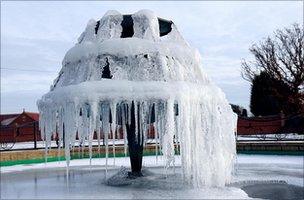Harrabin's Notes: What's the prognosis?
- Published
In his regular column, BBC environment analyst Roger Harrabin delves into the pros and cons of seasonal weather forecasting and looks at the UK Met Office's most recent winter forecast, obtained under Freedom of Information.
WHAT'S THE PROGNOSIS?

The Met Office has defended its winter forecast as a good one
If you are a government wondering how much your country should invest in snow ploughs, grit and salt, what level of warning do you require from your weather forecasters?
The question has arisen because I've just received full details of the previously-confidential Met Office winter forecast to the Cabinet Office, following an enquiry under Freedom of Information.
Now, seasonal forecasting is a science in its infancy. The World Meteorological Organisation tell me that most "met" services don't publish them because they are so hit-and-miss.
The UK Met Office joined the non-publication club after being derided for getting seasonal forecasts wrong. The barbecue summer that wasn't stuck in people's minds.
But the Met Office kept quietly doing the forecasts anyway. And they laid their winter prognosis on the government on 25 October.
Decisions, decisions
Finally it's come my way. The Met Office was forecasting a 40% chance of a cold start to the winter, with a 30% chance of a mild start, and a 30% chance of an average start.
This doesn't match a more conclusive forecast I gleaned from a Met Office contact in December whilst researching an article for the Radio Times - though it does point in roughly the same direction.
Critics say the forecast is fence-sittingly unimpressive anyway. It meant there was a greater-than-average (60%) chance of a mild or average start to winter.
The Met Office defends the forecast as a good one - and points to the last line in bold - Summary: There is an increased risk for a cold and wintry start to the winter season.
The Cabinet Office itself didn't appear to have been seized by this advice. My own request for their correspondence over the winter forecast hasn't yet borne fruit, but I note a blog report (which I cannot yet verify) saying that a civil servant commented: "The Met Office seasonal outlook for the period November to January is showing no clear signals for the winter."
How much certainty would you need to buy an extra snowplough? Maybe not much if you are wealthy Heathrow, perhaps more if you were an impoverished local council. What about stocking up on grit and salt? A 40% chance of a cold start might be enough to persuade you to get in extra supplies sooner rather than later. Or it might not.
The government was criticised in the media earlier this month for failing to publish the advice to ordinary folk planning their Christmas holidays. A spokesman for the Cabinet Office told me they had passed the forecast to key stakeholders ("Government departments, local council as appropriate - we don't have a list").
The forecast, he said, belonged to the Met Office - so it was up to the Met Office to decide who to share it with.
In the raw
The Met Office said its 30-day public forecast in early November clearly signalled cold conditions through late November and early December.
But it is still wary of publishing seasonal forecasts. It claims that people can easily misunderstand forecasts, adducing as evidence the furore in the blogosphere over a graph in October that was reported as saying that the Met Office forecast above-average temperatures for the winter.
The Met Office said that the map was raw data, and should not have been used as a simple forecast. Other vital weather factors had not been included.
I contacted the independent weatherman Philip Eden at the time and he said the Met Office online map had been mis-understood by journalists and bloggers reporting it.
He told me: "The Met Office are correct: it is not a forecast. It does not even indicate above average temperatures - rather, it suggests an above-average probability of above average temperatures. This would be only one of several outputs that they would consider in putting together a seasonal forecast".
The BBC's weather blogger Paul Hudson - who has been known to be critical of the Met Office - concurred. The question now is when will we all again be beneficiaries of the Met Office calculations about the season ahead?
Well, the Quarmby report for the government into winter preparedness reveals that the Chief Scientist John Beddington "advises me that significant progress is being made by the Met Office in being able to make seasonal projections with more confidence, certainly up to one month and potentially up to three months in advance, and could be incorporated into operational forecasting by winter 2011/12, given sufficient computing resource."
This is of interest to a project I am helping to run to compare the performance of weather forecasters over the long term. The Weather Test - being developed in partnership with the Royal Meteorological Society, the Royal Statistical Society and Royal Astronomical Society - will attempt to compare daily, weekly, monthly and seasonal forecasts by different weather providers.
Unbelievably no long-term publicly-available comparison of forecasters currently exists. It's proved too difficult over the years. Hopefully, we will put that right. And hopefully, all forecasters will agree to supply their data - whether it's experimental or not - for the benefit of science. With luck it will put an end to controversies like this.
- Published11 January 2011
- Published13 December 2010
- Published9 December 2010